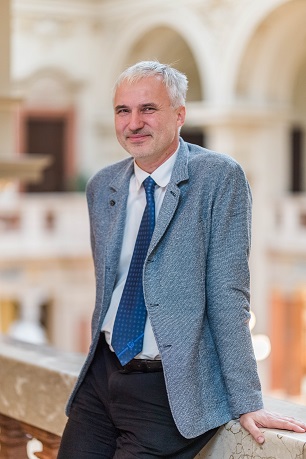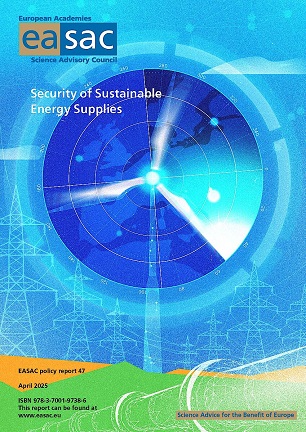
Renewables are a strategic investment in European security, scientists say
22. 04. 2025
Europe’s dependence on imported fossil fuels – especially oil and natural gas – exposes it to geopolitical blackmail and makes it economically vulnerable. That’s why it is essential to continue diversifying energy sources without replacing one dependency with another. Supporting domestic sustainable energy and innovative technologies is key also for security reasons. But these bring risks as well. Energy appears to be the Achilles’ heel of Europe, scientists warn in a report issued by the European Academies Science Advisory Council (EASAC). Physicist Antonín Fejfar and legal expert Rita Sik-Simon contributed to the report on behalf of the Czech Academy of Sciences (CAS).
The European Union has already been discussing support for renewable energy sources for years. Until recently, however, the topic was mostly framed in connection with efforts to combat climate change. But after the invasion of Ukraine by Russia in 2022 and additional geopolitical shifts around the world, energy diversification has become increasingly associated with the security of the continent.
“Renewable energy sources are not only economically advantageous given the current circumstances, they are also of strategic importance. Integrating renewables leads to a restructuring of energy systems – specifically, to greater flexibility and, as a result, increased resilience,” emphasizes Antonín Fejfar from the Institute of Physics of the CAS, one of about thirty scientists who co-authored the in-depth analysis on the security dimensions of renewable energy.

Antonín Fejfar’s research focuses on the physics of thin films of nanostructured semiconductors, primarily for use in photovoltaics and photonics. (CC)
Not relying on the USA, either
The EASAC report also highlights the importance of avoiding a mere shift from one dependency to another. Since the invasion of Ukraine, the EU has managed to partially cut itself off from Russian energy sources – but this also raises the risk of becoming too closely dependent on other countries. In the case of liquefied natural gas, for instance, this includes the USA, which the report authors explicitly describe as an “increasingly volatile trading partner.”
According to Antonín Fejfar, the 2025 analysis does not yet reflect the most recent unpredictable decisions by US President Donald Trump regarding tariffs and trade barriers. “The shifting stance of the United States is something we’ve been seeing for some time. From a net energy importer, the USA has gradually become a major exporter,” the Czech scientist notes.
Extract or import?
Harnessing energy from the sun or wind is clearly more environmentally friendly than burning fossil fuels. But renewable energy is not without its own security risks. Solar photovoltaics as well as wind generators and batteries are largely imported from outside of Europe – most often from China. Europe is also heavily reliant on imports of key mineral resources used in energy systems, including nickel, copper, cobalt, and lithium.
“Many [of these materials] come from geopolitically volatile regions so it is wise to purchase them from diverse and trusted sources, and to build partnerships with suppliers,” the report states. The topic of critical raw materials was a major point of discussion, particularly with regard to the European continent’s (lack of) self-sufficiency. The issue is not that these materials are unavailable in Europe – lithium, for instance, could be mined. But any mining operation affects the environment and living conditions in the region concerned.

The report by European scientists focuses on energy security, renewable energy sources, and the geopolitical fragility of today’s world.
Attacks on Europe’s energy sector
The report also stresses the need to protect the energy sector from cyberattacks, which have been on the rise in recent years. Information technologies are used in every stage of the electricity supply chain, including transmission and distribution networks and energy producers. Disruption caused by a hacking attack could lead to power outages or even widespread blackouts.
“There is no security without energy security,” says William Gillet, Director of the EASAC Energy Program, summarizing the report’s core message. “Every investment in sustainable energy is an investment in our security. In contrast, every euro we spend on energy imports is a euro lost from our defense capability,” adds Paula Kivimaa, Co-Chair of the EASAC working group.
What Is EASAC?
EASAC brings together representatives of the national science academies of EU member states, Norway, Switzerland, and the United Kingdom, along with Academia Europaea and ALLEA (the European Federation of Academies of Sciences and Humanities, which includes both EU and non-EU members). EASAC provides science-based policy advice to decision-makers at the EU level.
The full report on the security of sustainable energy supplies is available on the EASAC website.
Written and prepared by: Leona Matušková, External Relations Division, CAO of the CAS
Translated by: Tereza Novická, External Relations Division, CAO of the CAS
Photo: Shutterstock; Pavlína Jáchimová; EASAC
 The text and photos labeled CC are released for use under a Creative Commons license.
The text and photos labeled CC are released for use under a Creative Commons license.
Read also
- New record set for neutrino mass: one million times less than an electron
- On the trail of the endangered little owl: searching for newly hatched owlets
- Teen scientist breaks barriers: No child is a lost cause
- The Czech Academy of Sciences has appointed its new leadership for 2025–2029
- Literature is tied to its historical context. How can we read between the lines?
- Radomír Pánek: The Academy must be united, strong, and proactive
- A springtime booster: The healing potential of tree buds
- A novel compound that protects bone cells may benefit diabetic patients
- New interactive exhibition at the CAS showcases materials shaped by genius ideas
- Leaf growth, root formation, and reproduction – Look to hormones for the answer
The Czech Academy of Sciences (the CAS)
The mission of the CAS
The primary mission of the CAS is to conduct research in a broad spectrum of natural, technical and social sciences as well as humanities. This research aims to advance progress of scientific knowledge at the international level, considering, however, the specific needs of the Czech society and the national culture.
President of the CAS
Prof. Eva Zažímalová has started her second term of office in May 2021. She is a respected scientist, and a Professor of Plant Anatomy and Physiology.
She is also a part of GCSA of the EU.